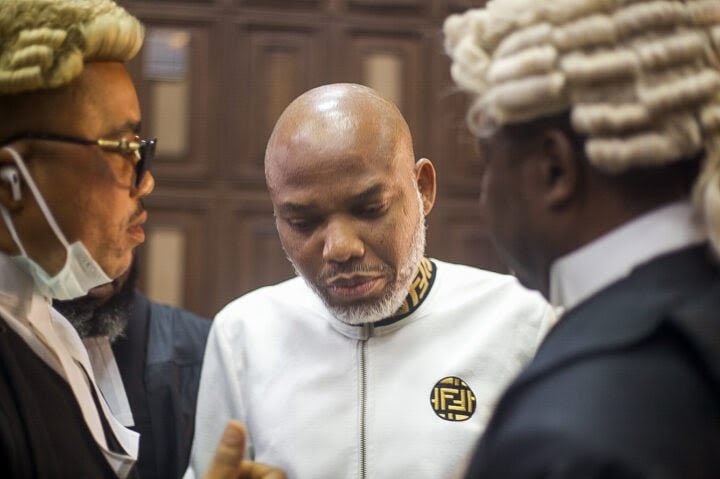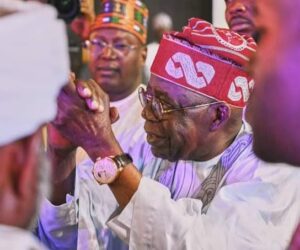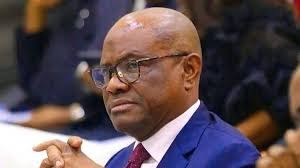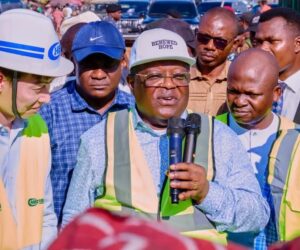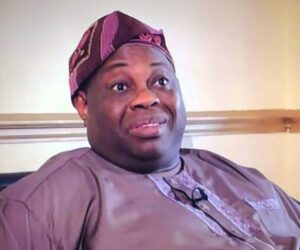In a dramatic turn during his ongoing terrorism trial, Justice James Omotosho of the Federal High Court in Abuja has granted proscribed Indigenous People of Biafra (IPOB) leader Nnamdi Kanu a seven-day window to submit his final written address, allowing him to formally challenge the validity of the charges against him without entering a full defense.
Kanu, who has been in detention since his 2021 rendition from Kenya, appeared in court on Monday representing himself after abruptly disengaging his high-profile legal team led by Chief Kanu Agabi, SAN, earlier in the week.
The 56-year-old agitator for Igbo secession, charged with seven counts of terrorism, treasonable felony, and managing an unlawful society, pleaded not guilty at the outset of the trial and has consistently maintained that the proceedings are baseless.
The hearing stemmed from Kanu’s earlier no-case submission, which Justice Omotosho overruled on October 21, ruling that the prosecution, led by Chief Adegboyega Awomolo, SAN had established a prima facie case requiring a defense.
In response, Kanu filed a motion seeking to summon 23 witnesses, including prominent Nigerians and international figures, categorized as “ordinary but material witnesses” and “vital and compellable” under Section 232 of the Evidence Act, 2011.
He had requested a 90-day period to prepare his case.However, proceedings hit a snag last Thursday when Kanu dismissed his lawyers, citing irreconcilable differences, and insisted on self-representation.
The court adjourned to Friday, but delays arose as Kanu claimed he had not received the case file from his former counsel.
Resuming on Monday, the courtroom was prepared for potential testimony, with five seats reserved and labeled “summoned witness” in anticipation of Kanu’s defense.
During the session, Kanu vehemently argued that no valid charge existed against him.
“There is actually no charge against me,” he told the court. “There is no extant law in the country on which the prosecution could premise its case.
There is no case against me. If there is no case against me, it will be futile for me to enter any defence.”
He further demanded immediate release or bail, emphasizing that the trial was “needless” and his continued detention unlawful.
Justice Omotosho, known for his meticulous handling of high-stakes cases, patiently outlined the defendant’s three procedural options post-prosecution closure: entering a full defense after a failed no-case submission, resting entirely on the prosecution’s case, or filing a written address for the court to consider alongside evidence before judgment.
The judge overruled Kanu’s verbal objections as an informal defense, insisting it be formalized in writing and served on the prosecution.
Appearing for the federal government, Awomolo countered that Kanu’s stance effectively closed his defense, urging the court to proceed to judgment.
“I take it that the defendant said he is not putting in any defence, because there is no valid charge against him,” Awomolo stated.
“I want to submit that this position is conclusive of the defendant’s defence. I know that he took a plea to counts against him and he pleaded not guilty.
We led evidence and he cross-examined our witnesses. Now that he said he has no defence, the case has been brought to a close.
“In a moment of judicial compassion, Omotosho urged the self-representing Kanu who holds a degree in economics but no legal training to seek counsel from criminal law experts.
“I am begging you in the name of God Almighty, to consult properly,” the judge implored.
“I know you are educated, but you are not a lawyer. You need to consult experts in the field. Please make adequate consultation. This is not economics. This is criminal prosecution.”
Despite initially considering assigning pro bono lawyers or referring the matter to the Legal Aid Council a step Kanu rejected the judge extended the timeline from an initial four days to a full week.
The extension marks a pivotal juncture in Kanu’s protracted legal battle, which has drawn international scrutiny from human rights groups like Amnesty International and the United Nations, who have called for his unconditional release citing alleged violations of fair trial rights.
Supporters of the IPOB leader, who view him as a political prisoner fighting for self-determination in Nigeria’s southeastern region, have staged protests and filed appeals to higher courts, including the Supreme Court, which in 2022 quashed his initial charges but allowed the government to refile.
Kanu’s decision to go solo echoes his history of distrust in Nigeria’s judiciary, which he has repeatedly accused of bias under federal influence.
The case, transferred to Omotosho’s court in 2023 after multiple recusals, has seen the prosecution close its case following testimony from 10 witnesses, including operatives from the Department of State Services (DSS), where Kanu remains held.
The matter is adjourned to November 4, 5, and 6, 2025, for adoption of the written addresses or, should Kanu reconsider, the opening of his defense. With the clock ticking, all eyes remain on whether the IPOB firebrand will heed the judge’s advice or double down on his solitary stand, potentially shaping the trajectory of Nigeria’s most divisive separatist trial.
Click to signup for FREE news updates, latest information and hottest gists everyday
Advertise on NigerianEye.com to reach thousands of our daily users

